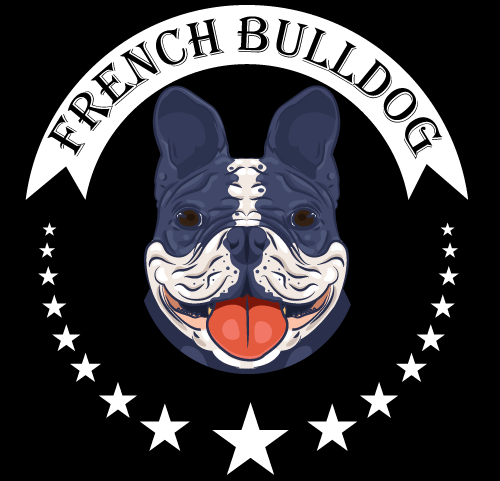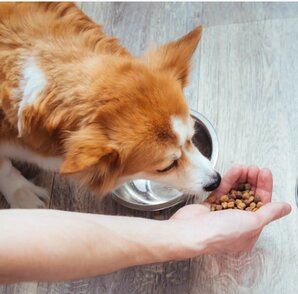Are you eager to learn the ropes on “How to bulk up my French Bulldog” and sculpt your furry companion into a four-legged powerhouse? Well, buckle up because we’re about to dive into a comprehensive guide that covers everything from nutrition to exercise. Before we embark on this journey, let’s address one vital aspect – the diet of your French Bulldog. Ensuring your pup receives the right nutrients is crucial, and a significant player in this game is choosing the best wet food for your French Bulldog puppy. A balanced, high-quality diet is the cornerstone of muscle development, and we’ll explore how the right wet food can contribute to your Frenchie’s overall well-being.
Now, let’s talk puppy power! If you have a French Bulldog in their early stages of life, optimizing their diet becomes even more critical. The best-wet food for French Bulldog puppies not only provides the essential nutrients for growth but also adds a dash of deliciousness to their daily dining experience. So, as we uncover the secrets to bulking up your Frenchie, we’ll sprinkle in some wisdom on choosing the best wet food to keep those puppy muscles in top-notch condition. It’s time to blend muscle-building expertise with gourmet delights for a French Bulldog journey that’s as savory as it is strong!
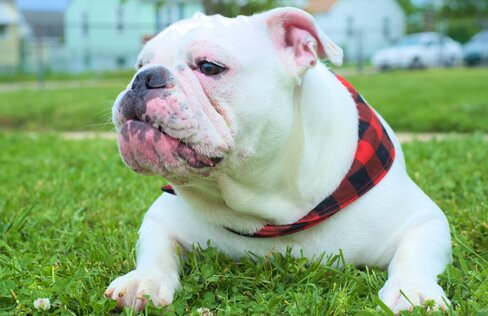
Nutrition for Bulking Up: A Balanced Diet
French Bulldogs, like other breeds, require a well-balanced diet to support their overall health and, if applicable, muscle development. While French Bulldogs may not have the same emphasis on bulking up as some larger breeds, they still need a nutrient-rich diet. Here’s a guide to a balanced diet for a French Bulldog:
1. Protein:
Source: Choose high-quality, lean animal protein sources. Look for dog food that lists real meat (chicken, turkey, fish) as the main ingredient.
Amount: Aim for a protein content of around 18-22% in their diet. French Bulldogs don’t typically require as much protein as larger, more active breeds.
2. Healthy Fats:
Source: Integrate strong fats like omega-3 and omega-6 unsaturated fats. Sources integrate fish oil, flaxseed oil, and canola oil.
Amount: Ensure a moderate amount of healthy fats to support skin and coat health.
3. Carbohydrates:
Source: Choose whole grains like brown rice or oats. Carbohydrates provide energy for your French Bulldog.
Amount: Moderate amounts of carbohydrates to support their energy needs.
4. Fruits and Vegetables:
Source: Incorporate canine well-disposed foods grown from the ground like blueberries, yams, carrots, and green beans.
Amount: These provide essential vitamins and minerals. Just be cautious about certain fruits and vegetables that can be harmful to dogs.
5. Avoid Common Allergens:
- Be aware of potential allergens like soy, corn, and wheat. A few canines might be delicate or susceptible to these fixings.
6. Meal Portions:
- Divide your Frenchie’s daily food into two or more meals to support digestion and metabolism.
7. Hydration:
- Ensure your French Bulldog has access to clean, fresh water at all times.
8. Regular Exercise:
- While diet is crucial, regular exercise is also important for overall health. French Bulldogs can be prone to obesity, so engaging them in daily walks and play is essential.
Sample Daily Meal Plan:
- High-quality dry or wet dog food with real meat as the main ingredient.
- A small amount of cooked lean meat or fish as a treat.
- Occasional dog-safe fruits and vegetables.
Note:
Fitting your French Bulldog’s eating regimen to their particular needs is significant. Consider factors, for example, age, weight, action level, and any ailments. Standard veterinary check-ups will assist you with observing their wellbeing and make fundamental acclimations to their eating regimen. If you have concerns about your Frenchie’s diet or health, consult with your veterinarian for personalized advice.
High-Quality Dog Food Selection
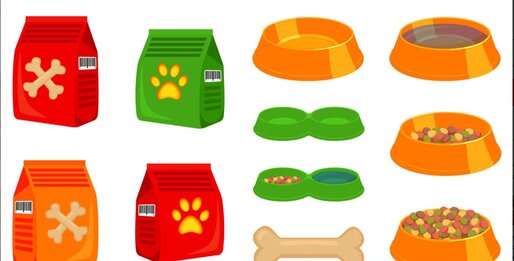
Choosing great canine food is urgent for your pet’s wellbeing and prosperity. The following are six moves toward assist you with picking the best canine food:
Research Various Brands:
Investigate different dog food brands by examining their ingredient lists, nutritional profiles, and customer reviews to identify high-quality options.
Prioritize Whole Ingredients:
Select dog foods that list whole, recognizable ingredients such as real meat, vegetables, and whole grains, avoiding excessive fillers, by-products, and artificial additives.
Check for Adequate Protein Content:
Ensure the chosen dog food provides a sufficient amount of high-quality protein, typically sourced from meat, to support your dog’s muscle development and overall health.
Consider Specific Dietary Needs:
Take into account your dog’s age, breed, size, and any specific health concerns when choosing a dog food formula, as different life stages and conditions may require specialized nutrition.
Consult with Your Veterinarian:
Seek advice from your veterinarian to determine the most suitable dog food for your pet, considering any individual health considerations or dietary restrictions your dog may have.
Gradually Transition and Monitor:
Introduce the new dog food gradually to your pet’s diet over several days to minimize digestive upset. Monitor your dog’s response, including coat condition, energy levels, and overall well-being, to ensure the selected food meets their nutritional needs effectively.
Protein-Rich Diet for Muscle Building
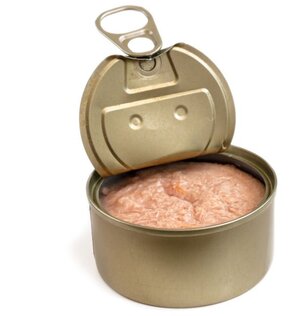
Feeding a bulldog a protein-rich diet is important for muscle building, overall health, and maintaining a strong physique. Bulldogs are known for their muscular build, and providing them with the right balance of nutrients, especially protein, is essential. Here’s a guide to creating a protein-rich diet for muscle-building in bulldogs:
1. High-Quality Animal Protein:
Choose dog food that lists a high-quality animal protein source as the main ingredient. Look for options with real meat, such as chicken, beef, lamb, or fish. These provide essential amino acids necessary for muscle development.
2. Protein Content:
Bulldogs typically benefit from a higher protein content in their diet. Look for dog food with at least 18-22% protein content. However, individual needs may vary, and consulting with your veterinarian is important to determine the right protein level for your specific bulldog.
3. Lean Protein Sources:
Opt for lean protein sources to support muscle development without excess fat. Avoid fatty cuts of meat or processed meats, as bulldogs can be prone to obesity.
4. Animal-Based Protein Treats:
Supplement your bulldog’s diet with occasional animal-based protein treats. This could include small amounts of cooked chicken, beef, or other lean meats. Avoid giving them bones that can splinter and cause digestive issues.
5. Balanced Diet:
While protein is crucial, ensure a well-balanced diet that includes other essential nutrients. Bulldogs also need carbohydrates, fats, vitamins, and minerals for overall health. Look for high-quality dog food that meets these requirements.
6. Consult with a Veterinarian:
Bulldogs may have specific dietary needs or health concerns that require individualized attention. Consult with your veterinarian to determine the ideal protein level, portion sizes, and overall nutritional requirements for your bulldog.
7. Hydration:
Sufficient water admission is fundamental for absorption and by and large wellbeing. Ensure your bulldog approaches perfect, new water consistently.
8. Monitor Weight and Adjust as Needed:
Bulldogs are prone to obesity, which can impact their health and mobility. Regularly monitor your bulldog’s weight, and adjust their diet and exercise routine accordingly to maintain a healthy weight.
Sample Protein-Rich Bulldog Diet:
High-quality dry or wet dog food with a real meat source as the main ingredient.
Occasional cooked lean meats like chicken or beef as treats.
Limited, dog-safe vegetables for added nutrients.
Supplementing for Muscle Mass
Supplementing for muscle mass in bulldogs should be approached cautiously. Focus on providing a balanced, high-protein diet with quality commercial dog food containing real meat sources. If necessary, consult your veterinarian before considering supplements. While some dogs may benefit from additional protein or specialized supplements, excessive intake can lead to health issues. Prioritize regular exercise tailored to your bulldog’s needs to promote muscle development and overall well-being. Always follow professional advice to ensure the supplements are appropriate for your bulldog’s individual health requirements.
Regular Exercise Routine
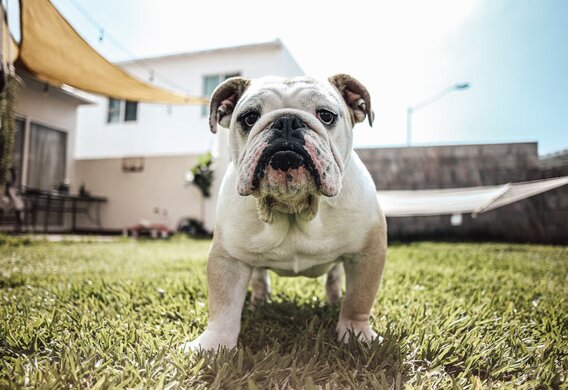
Laying out a normal workout daily schedule for your bulldog is essential for their general well-being and prosperity. Shoot for the stars 30 minutes of everyday exercise routine, as exuberant walks, instinctive play, or moderate running. Bulldogs can be leaned to strength, so charming in typical genuine work keeps a strong weight and supports muscle improvement. Be aware of their brachycephalic nature, and stay away from exhausting exercises during a sweltering climate. Incorporate mental stimulation through puzzle toys to keep them engaged. Tailor the exercise routine to your bulldog’s age, fitness level, and any health considerations, seeking veterinary advice for a personalized plan.
Weightlifting and Strength Training
Weightlifting and strength training are not recommended for bulldogs due to their unique anatomy and potential health risks. Bulldogs, known for their brachycephalic (short-nosed) structure, are prone to respiratory issues and overheating. Intense physical exertion, especially involving heavy weights, can strain their joints and exacerbate existing health concerns. Instead, focus on moderate, low-impact exercises that promote muscle tone and overall well-being.
Engage your bulldog in activities like brisk walks, agility exercises, or controlled play sessions to maintain a healthy weight and enhance muscular development without putting undue stress on their bodies. Always consult with your veterinarian to design a safe and suitable exercise regimen based on your bulldog’s individual health needs and limitations.
Consultation with a Veterinarian
Regular consultation with a veterinarian is paramount for the well-being of your bulldog. Schedule routine check-ups to monitor their overall health, weight, and address any potential issues promptly. Discuss your bulldog’s diet, exercise routine, and behavioral concerns with the vet to ensure they receive tailored care. Vaccinations, parasite prevention, and dental health should be part of the agenda. Additionally, if you observe changes in behavior, appetite, or energy levels, seek prompt veterinary advice. Early detection of potential health issues allows for effective intervention and ensures a long, healthy life for your beloved bulldog.
Monitoring Body Condition
Regularly monitoring your bulldog’s body condition is crucial for maintaining their health. Assess their weight, feeling for a well-proportioned body with palpable ribs and a distinct waistline. Adjust their diet and exercise accordingly to prevent obesity or excessive leanness. If you’re uncertain about their body condition, talk with a veterinarian for direction. Watch out for changes in craving, energy levels, and by and large way of behaving, as these could demonstrate medical problems. By remaining mindful of your bulldog’s body condition, you can make informed acclimations to their consideration, guaranteeing they keep an ideal weight and generally speaking prosperity all through their life.
Hydration Importance
Guaranteeing legitimate hydration is of vital significance for the prosperity of your bulldog. Bulldogs are defenseless to warm-related issues because of their brachycephalic nature, making them more inclined to overheating. Sufficient water admission is essential to manage internal heat levels, support processing, and keep up with general well-being. Continuously give admittance to perfect, new water, particularly during hotter climates or after active work. Dehydration can lead to serious health complications, including organ dysfunction. Monitoring your bulldog’s water intake and promptly addressing any changes is essential for preventing dehydration and promoting their overall vitality and longevity.
Consistency and Patience
Consistency and patience are key when caring for a bulldog. Establishing a routine for feeding, exercise, and training builds a sense of security and predictability for your furry companion. Bulldogs thrive on stability, so maintaining a consistent environment fosters their well-being and helps prevent stress-related issues. Whether it’s meal times, walks, or play sessions, sticking to a reliable schedule creates a positive and reassuring atmosphere for your bulldog.
Patience is equally essential when addressing behavioral challenges or introducing new habits. Bulldogs may have their own pace in learning commands or adapting to changes. Approach training with a calm demeanor, offering positive reinforcement, and allowing them the time needed to grasp new concepts. Building trust through consistent care and patient guidance strengthens the bond between you and your bulldog, contributing to a happy and harmonious relationship.
Conclusion
Enhancing the physique of your French Bulldog requires a strategic approach encompassing nutrition, exercise, and veterinary guidance. To bulk up your beloved Frenchie, prioritize a balanced diet rich in high-quality protein to support muscle development. Opt for premium dog food with lean protein sources and essential nutrients, ensuring a well-rounded nutritional profile. Additionally, consider consulting with a veterinarian to tailor a diet plan that meets your French Bulldog’s specific needs and health considerations.
Furthermore, a consistent exercise routine plays a pivotal role in promoting muscle growth and overall well-being. Engage your French Bulldog in daily walks, interactive play, and even light resistance training to stimulate muscle development. Keep in mind that each dog is unique, and it’s crucial to monitor your Frenchie’s progress while making adjustments to their regimen accordingly. By combining a nutritious diet with a tailored exercise routine, you can cultivate a healthier, more muscular physique for your French Bulldog, ensuring they lead a happy and active lifestyle.
